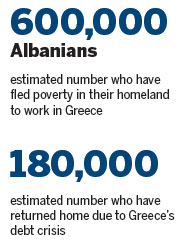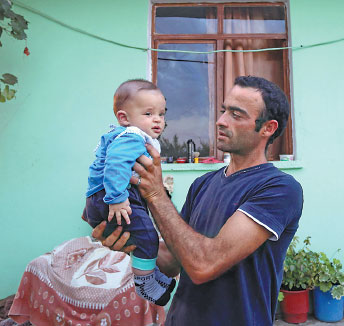Crisis hits Albanian families living on little cash
Lorenc Toska returned from Greece to his village in central Albania with empty pockets. He had been working there hoping to secure a better life for his family, but the crisis in the neighboring country ruined his dreams.
"I returned penniless, with my only luggage being a small bag with my work clothes," the 25-year-old Toska said, hugging his baby boy.
More than 600,000 Albanians fleeing the poverty in their homeland have gone to seek their fortune in Greece, many of the millegally, according to official estimates,
But since Greece's debt crisis deepened, about 180,000 Albanians have returned home, officials say.
Toska, whose in come was the only source of survival for his wife, their two children, his parents and a grandmother, was only able to send them 200 euros ($224) since March.
Instead of paying Toska what he was owed, his Greek boss ordered him to leave Greece, threatening to inform the police of his illegal status.
"I was working in the cotton fields for the past three years, often 14 hours per day. My boss promised to pay us everything, due to the crisis, in mid=June, but instead we had to leave," Toska said.
In his village of Suk, which has 1,800 inhabitants, many families live on remittances from their children and relatives working in Greece.
Zymbyle Kodheli was receiving around 1,000 euros a year from her son. The money had supported the woman in her 50s, her ill husband Qayim and their two daughters.
But their situation has changed drastically.
"He is now unemployed and sends us almost nothing. He picked a better life in Greece but his dream and ours are now shattered," lamented the mother.
However, Kodheli, 37, does not believe that her son and his family will return to the Albanian village where, she said, "everything seems to be frozen in time".
In a local shop, a list of clients' debts is getting longer everyday. "At least 30 families have relatives working in Greece, but the money does not come any longer, and they cannot pay me," said Altin, the shop owner.
"They are waiting for the money... but it seems that the crisis in Greece will persist," he said.
Athens' announcement of capital controls following a collapse in negotiations with its creditors, which saw banks closed temporarily and international transfers vetted, "provided an excuse for Greek bosses not to pay Albanian immigrants", he added.
Around 160,000 Albanian families who survive on foreign remittances were hard hit not only by the crisis in Greece but the economic stagnation in Italy.

|
Lorenc Toska, 25, holds his 6-month-old son, Ardit, in the village of Suk, near Fier, on Monday. Gent Shkullaku / AFP |
(China Daily 07/02/2015 page12)















